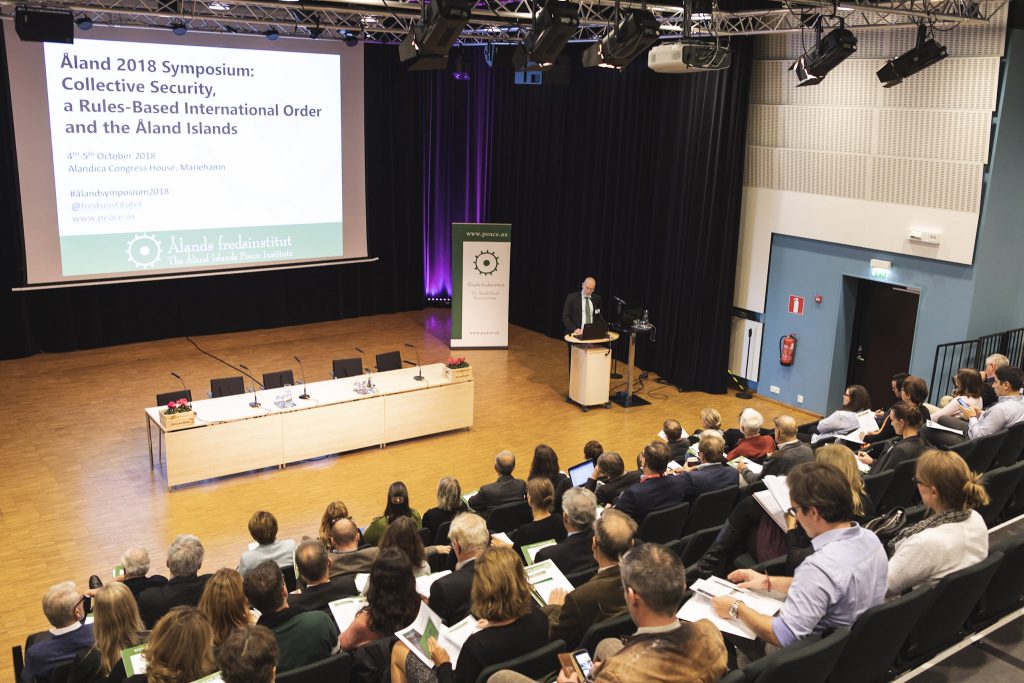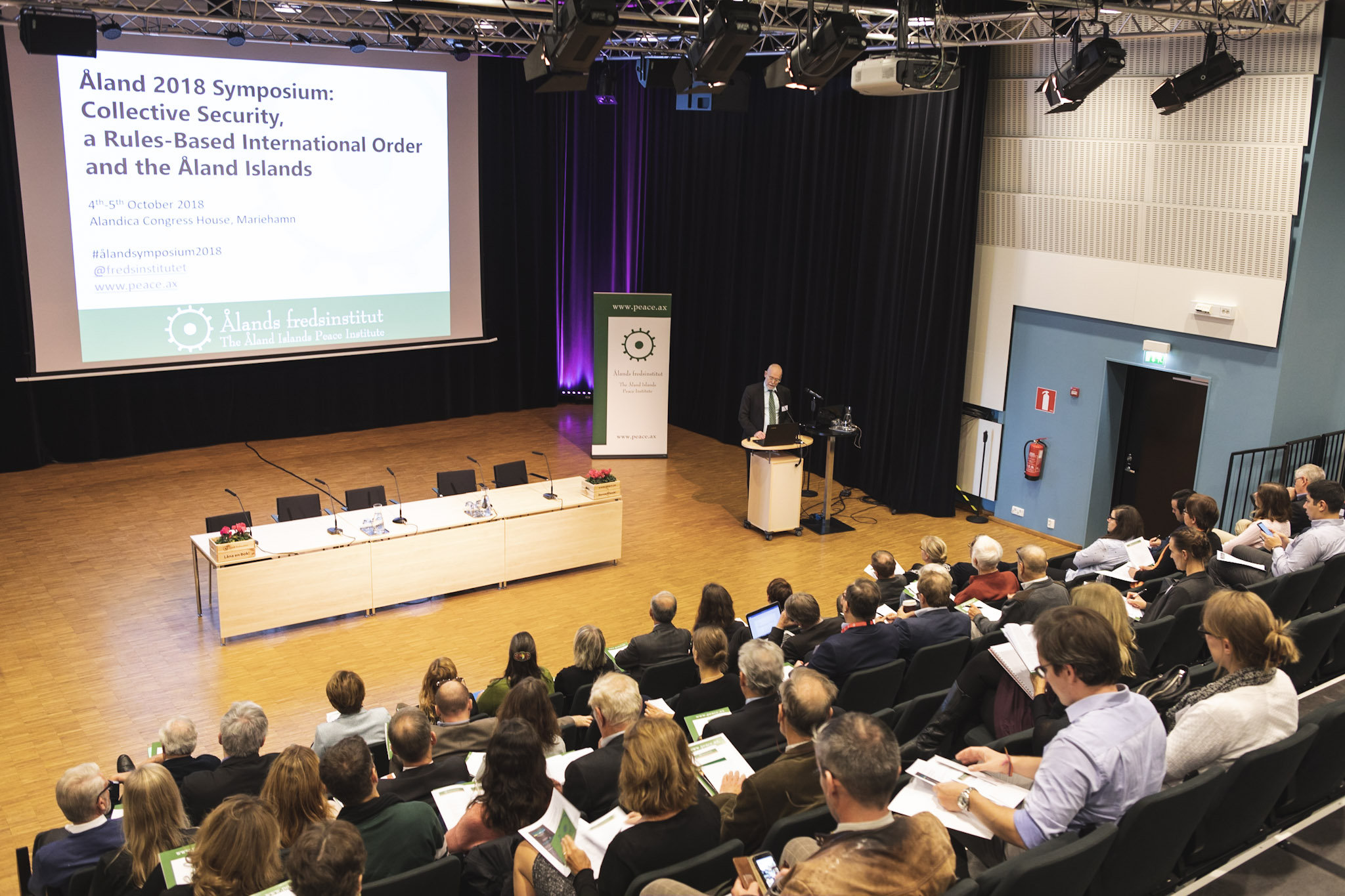Omkring 50 personer deltog i symposiet ”Collective Security, a Rules-Based International Order and the Åland Islands” samt seminariet ”Demilitarisering och tillit – fallen Åland och Svalbard” som hölls i Mariehamn 4-5 oktober 2018.
{besps}|width=460|height=307|||ctrls=1{/besps}
Bilder av Kim Lindström
Här kan du lyssna på en intervju ’Svalbard okänd kusin mellan Norge och nordpolen’ med fredsinstitutets direktör Sia Spiliopoulou Åkermark, och Geir Ulfstein, professor i folkrätt vid universitetet i Oslo.
Sammanfattningen nedan är skriven av Hasan Akintug, forskningspraktikant på Ålands fredsinstitut.
Day 1, 4.10.2018
The symposium titled “Collective Security, a Rules-Based International Order and the Åland Islands” was held in Mariehamn on 4-5 October 2018. The symposium was opened by the Permanent State Secretary at the Finnish Ministry for Foreign Affairs, Matti Anttonen. Mr. Anttonen emphasised the importance of a rules-based international order in relation to the Åland Example and gave a brief historical overview on the development of the Åland Example within the context of international relations. The first speaker was Timo Koivurova, director of the Arctic Centre at the University of Lapland who presented the past and present of arctic co-operation. His focus was on the paradoxical nature of Arctic co-operation in the context of sanctions against Russia in the aftermath of the occupation of the Crimea in 2014. He emphasised the positivity of the ongoing co-operation in many different fields which may deviate from absolute moral positioning but allow for pragmatic modes for generating trust among the actors in the region. He was followed by Sia Spiliopoulou Åkermark, who focused on how the results of a three-year long research project on the demilitarisation and neutralisation of Åland and how it is affected by recent developments within the field of security cooperation. She focused on Åland as a small element of the containment of force within global and regional collective security regimes. Her conclusion was that although the overall discourse regarding security appears to have shifted towards a securitising, or even militarising attitude, the demilitarisation regime is respected. Saila Heinikoski’s analysis provided insight on the interaction between demilitarisation and regional security integration within official Finnish Government documents over the last 20 years. During her presentation, she particularly noted that during periods of stability and security the emphasis on demilitarisation was focused on arguments based on international law, while during periods of fears and securitisation argumentation was based on military considerations. Finally, Pirjo Kleemola-Juntunen gave a presentation about the demilitarised status of Åland from a law of the sea perspective with a focus on the right of “innocent passage” in the Åland strait and emphasised that although Åland’s status has been perceived as a burden within some Finnish political circles, it has been beneficial for the country overall. The presentations were followed by a panel discussion with several questions, comments, and proposals from the audience.
Day 2, 05.10.2018
The second day of the symposium began with the presentation of Tuomas Forsberg, who chose to focus on the topic of trust in international relations amid claims of the “end of the liberal era”. His main argumentation focused on the fact that no single actor on the international scale has the power to unilaterally alter the international system. The current lack of trust is a hindrance to a discourse-based international order despite some limited indications of trust found in regional cooperation areas such as the Arctic. A discourse-based international order runs parallel to understandings of international order as based on realist interests or, alternatively, on international agreements and institutions. Lauri Hannikainen continued with a presentation of work in progress on the issue of the Continuation War and provided an analysis of the war from a legal perspective. He noted that while Finland appears to have violated international law during its offence against the Soviet Union in alliance with Germany, there were some mitigating factors in favour of Finland. He describes these factors as the Soviet Union’s behaviour during the preceding Winter War and the limited intent of the Finnish side during the war. He concluded by claiming that when arguments for and against the Finnish positions were considered, Finland was treated too harshly in the Post-War Peace Settlement. The final presentation was given by Geir Ulfstein, who presented on the issue of the restrictions on military activities on Svalbard and contemporary developments regarding the situation there. After a short introduction to the region, he focused on the historical developments regarding Svalbard and the overall durability of the 1920 treaty. In the concluding panel discussion, several issues regarding foreign policy and continuity were brought up by audience members. Once such question highlighted that the role of Russia in relation to the demilitarisation and neutralisation of the Åland Islands since neutralisation is not an element of the 1940 bilateral treaty. Another matter that was brought forward included a question regarding how the Åland and Svalbard regimes interact to external pressure regarding security arrangements. It was also noted that while Russia was involved in Arctic cooperation after the Cold War era, the cooperation has largely maintained an inter-governmental nature as opposed to the relatively restricted cooperation on a local government and civil society level.
The symposium was followed by a seminar in Swedish and open to the general public. Between 50 and 60 participants joined discussions at Alandica Congress House in Mariehamn.
Symposium summary by Hasan Akintug




